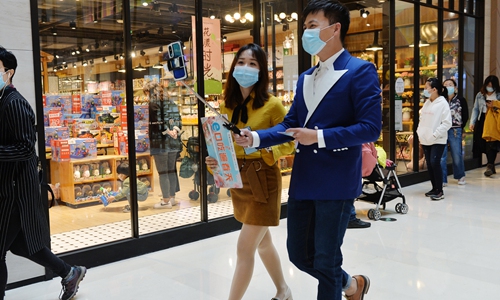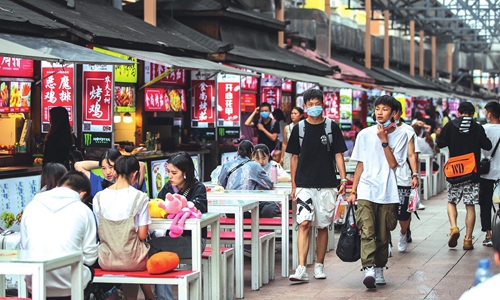Chinese cities issue digital voucher to instill consumer confidence during Spring Festival
Bigger consumption potentials to be unleashed later in 2021: analysts

People visit a shopping mall at Tianjin's Hexi district on Saturday, as the district allocated 5 million yuan ($706,085) in vouchers to promote business recovery at a local consumption festival. The district plans to issue a total of 22.5 million yuan in vouchers to boost the economy. Photo: VCG
Multiple cities in China have issued consumption vouchers and a variety of benefits, aiming to bolster consumer confidence during the upcoming Spring Festival holiday while containing COVID-19 still remains a vital task for the country.
Analysts predicted that catering and entertainment-related consumption in large cities will reap benefits from the "staying put" policy.
Beijing announced on Tuesday to release digital consumption vouchers worth 40 million yuan ($6.21 million) on six e-commerce platforms, starting from February 12. Any lucky residents who get their hands on a voucher can spend it when ordering take-out food or purchasing festival products online.
As of Tuesday, China's online payment platform WeChat Pay under tech giant Tencent had facilitated 12 cities and institutions across China issue digital consumption vouchers worth more than 400 million yuan.
Wuhan - the city in Central China's Hubei Province hit hard by COVID-19 has issued the first batch of consumption vouchers with the total amount reaching 100 million yuan on Monday. Local residents can use the voucher to make purchases at shopping malls, mobile phone stores, supermarkets, groceries, film theaters and barbershops.
Northeast China's Jilin Province plans to issue consumption vouchers worth 300 million yuan to support local business across entrainment, tourism, and education.
While some cities and provinces issue digital vouchers, Hangzhou in East China's Zhejiang Province where nestles a number of e-commerce companies decided to give 1,000 yuan per person who stay in the city during the holidays.
China's growing tech hub Shenzhen in South China's Guangdong Province said to issue multiple benefits including free vocational training to workers staying put in the city during the holidays.
The issuing of consumption vouchers clearly demonstrated the cities have capacity to ensure the health and safety of residents, said Zhang Yi, CEO of Shenzhen-based iiMedia Research.
"These cities have provided a signal that they have capacity to control the virus at the same time encouraging its residents to consume during the Spring Festival holidays," Zhang noted, adding that entertainment-related consumption, such as film and offline shows maybe popular among consumers during the holidays.
Qin Jiaxing, a 24-year-old urban planner at China Academy of Urban Planning & Design, said it was her first time to celebrate the Spring Festival in Beijing. "But I won't be alone because our academy has arranged many events during the seven-day holidays and the major part of the costs will be paid by the academy."
"Home parties on New Year's Eve, visiting the park, spa, skiing and making dumplings… We plan to have fun every day during the holiday. I feel my boss really takes care of the unmarried employees remaining in Beijing," Qin told the Global Times on Tuesday.
As many people decide not to go back to hometowns, some have bought special presents for the Spring Festival online and mailed them to their parents.
According to official statistics by China's ministry of commerce, food sales on e-commerce platforms surged 40 percent starting in late January year-on-year during online Chinese New Year's shopping spree. Sales of set menu for New Year's Eve dinner on major e-commerce platforms jumped 96 percent year-on-year.
Mi Xue from North China's Tianjin works in Beijing. She bought many snacks from online shopping platform Taobao.com and mailed them to her parents as a present for the festival.
"My main expense during the holidays in Beijing will be on food, films and shopping. I really miss trying on clothes in shopping malls as I have been shopping online during the whole virus outbreak period last year," Mi told the Global Times.
Considering the "staying put" policy to reduce massive population movement during China's biggest festival, consumption in southern China will be more robust compared with inland regions and people in big cities will purchase more than those in villages and small towns, because many migrant workers do not come back to hometowns, said Tian Yun, vice director of the Beijing Economic Operation Association.
"However, the consumption during this Spring Festival season may not recover to the pre-COVID level as the virus containment measures still curb people's consumption in catering, shopping and travels," Tian told the Global Times on Tuesday.
China's per capita disposal income grew 2.1 percent in 2020 after adjusting for inflation, but the per capita consumption expenditure dropped 4 percent year-on-year, the National Bureau of Statistics said.
As many migrant workers choose to stay in factories and deliverymen decide to earn extra bonus over the break, China's supply side over the first two months won't slow down, Tian noted. "As long as China maintains strong production and increases people's income in the first two quarters, the country's consumption performance would be outstanding later this year. Consumers will gain confidence to spend money when weather gets warmer and their pockets full of spendable money."




